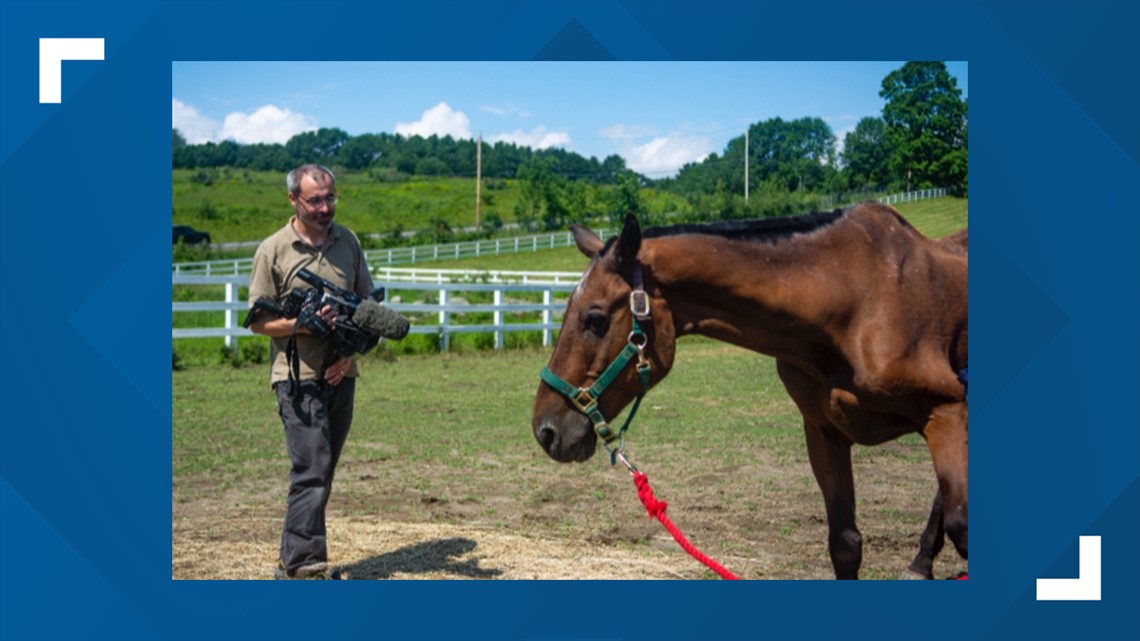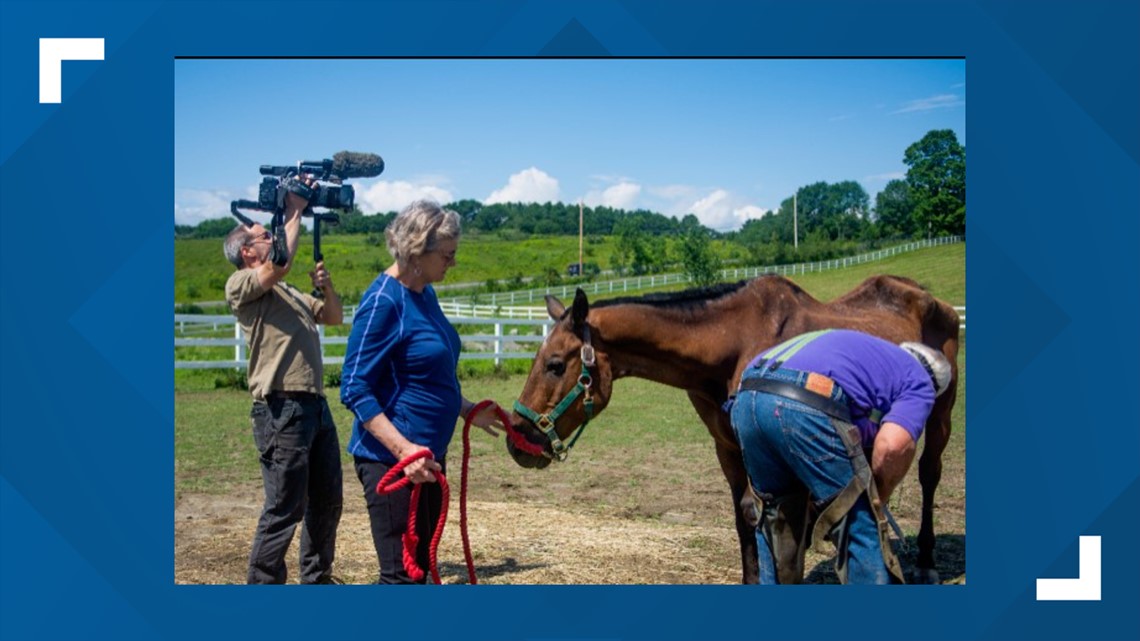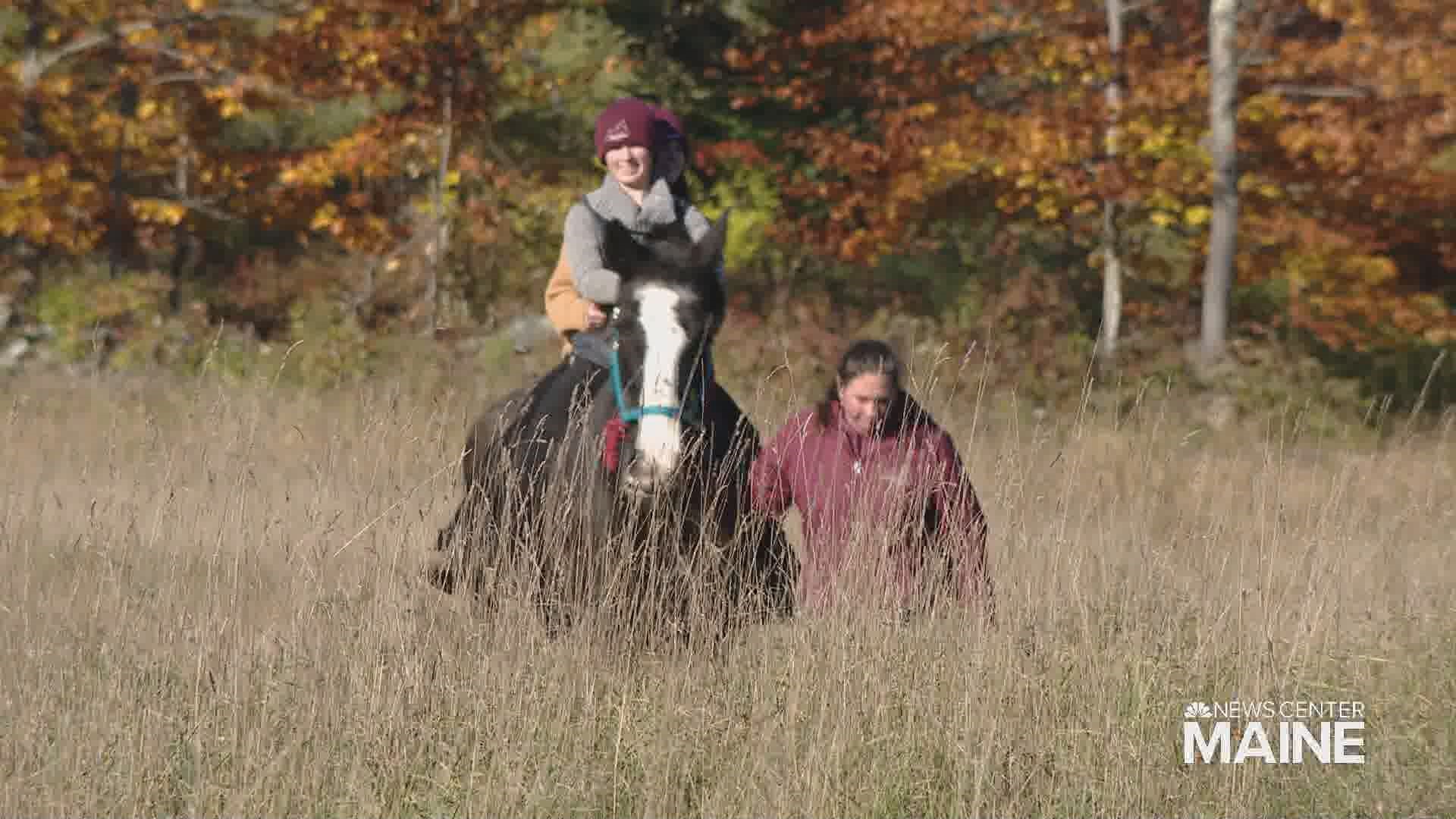WINDHAM, Maine — There is a network of agencies across our state that works tirelessly to rescue and find new homes for animals. New England, and Maine in particular, has a reputation for doing this work exceptionally well.
One of these groups, the Maine State Society for the Protection of Animals, or MSSPA, focuses on horses, some from owners who can no longer care for them, others taken by the state because of abuse or neglect.
This past summer, a herd of 20 horses was seized from a farm in Springvale. That was only the beginning of the story. In a special two-part report, 207 has followed the progress of the herd since then.
It was an unprecedented effort for the team at the MSSPA. What goes into bringing a horse back to good health? How would these animals fare after enduring all sorts of health challenges? Over these last few months, we tracked the progress of one horse in particular and learned that the outcomes for these horses are not guaranteed.
Part One
It was an overcast July afternoon when they arrived. Trailer … after trailer … after trailer ... 20 horses that had been seized from a farm in Springvale, some of them close to death.
The staff and volunteers at MSSPA work day in and day out, receiving animals that have been surrendered, severely abused, or neglected. But this seizure was unique.
"I’ve been here about 15 years. Generally, horses come in one, two, three at a time, and we know something about them because there’s a bit of a run-up to the actual seizure that the state might be communicating with us," said MSSPA CEO Meris Bickford. "The scope of this particular enterprise is really historic for the MSSPA. It is the largest, by number, seizure that we’ve experienced, I believe, in the 149 years that the organization has been in existence."
The horses that make it to this farm are the lucky ones. The staff and volunteers here work year-round to assess horses that arrive and address their various physical, medical, and emotional needs. They were as ready as they could be to receive this herd, soon to be known as "The Neglected 20."
Methodically and calmly, the team led each horse off the trailers and into the fresh, green pastures. Some of the horses were wild mustangs with little or no human contact. All of the horses would be quarantined until they could be vaccinated and assessed. The animals showed protruding ribs, coats in poor condition, and feet that had been badly neglected.
But the MSSPA team waited anxiously for the last horse to arrive. Word had come from Springvale that horse 14, or H14 as he was labeled during the seizure, was so frail, so fragile, he had to be trailered alone.
"The condition that he was in, if we put him with another horse that was in better condition and got excited on the trailer because he was so emaciated and weak, if he slipped in the trailer while moving, the other horse could have done more damage as far as injuries," said MSSPA Barn Manager Jeff Greenleaf.
When the trailer door swung open, H14 tentatively stepped out onto solid ground at his new home: a place ready to care for him, a place where he could heal. There were audible gasps from the folks who had been waiting for his arrival, few of whom had seen a horse so emaciated.
"He just didn’t have food," Greenleaf said. "He just wasn’t fed proper nutrition or any nutrition. And because of his age and the condition he’s in ... the other animals in better condition would push him off the feed, and he was too weak to really do anything about it."
He’s believed to be about 27 years old. His weight on this day was about 700 pounds, roughly 200 pounds under where it should have been.


"So been here seven years and almost a month now, and over those seven years that is probably the second one that is in that condition that I’ve seen come in here," Greenleaf said. "There have been other horses that’ve come in here emaciated, just not to that extent."
H-14, in such fragile health, had a long and uncertain recovery ahead of him. But the care for all the horses begins immediately: medications to treat lice and worms, a gradual re-feeding program so they can begin to put on weight, attention to their teeth so they can chew properly.
A horse's hooves can tell you a great deal about how they are faring. The hooves house many delicate bones that can easily be injured, and the bottom of the hoof must be kept clean, dry, and trimmed. Two weeks after the seizure, farrier Jon Deans arrived to work on some of the herd, including H14.


"This horse has been like this for a long time," Deans said. "So I’m just gonna give it kind of a maintenance trim. Not get real crazy and try to get it back to perfect. That’ll come in time."
Dean found that his feet were not diseased, a pleasant surprise, as is H-14’s ability to balance enough to allow Dean to work on his feet. H-14 is covered with flies, but while normally a horse would shake his head or stamp his feet to shoo them away, H14 simply stood still. He nuzzled the camera, ever so gently, while Dean attended to his feet. A glimmer of curiosity. We left on that day with a glimmer of hope.
As much as we were all rooting for H-14, really the weakest of the herd, he did not survive. It was a reminder of the heartbreak of this type of work. A few weeks after that visit, he developed colic, a painful stomach condition that most horses overcome. H-14 was unable to stand on his own. It was too much for the fragile old guy, and he had to be put down. He was simply not strong enough to battle back. But the work continued: We went back to the farm in October to check in on the progress of the rest of the herd.
Part Two
We returned to the farm in mid-October, and the herd was out of quarantine. Rescue work, with these animals, has no set timeline.
Some of the horses responded immediately to their new home, began to put on weight, and did not have underlying health concerns. Others began to show more complicated problems and faced a longer recovery.
Three months to the day of the Neglected 20 arriving here, MSSPA Barn Manager Jeff Greenleaf updated us: Not all of the horses have made it, and a few have been adopted out.
"They’ve all been doing very well as far as handling," he said. "We’ve had unfortunately three that we had to euthanize due to illness and neglect prior to coming to us. We’ve adopted three out also which is a very good thing."
That brings the herd to 14. Among the original herd were four mustangs, horses that had had little or no human contact. One mare in the group had a filly by her side. Their recovery has also involved gradual exposure to people.
Greenleaf stood alongside the four mustangs as they contentedly munched on hay.
"The rest that we have here, like this little girl here, so she’s the youngest of the 20 that came in," he said. "She’s still with her mother which is right next to her, so she’s still nursing but she’s moved on to eating hay. She actually is on a grain feed right now, twice a day, along with the rest of these guys."
Greenleaf continued, "When they first came in to us we could not manage them or handle them at all, where now we can halter them, we can lead them, we can have their feet done. Do general basic groundwork and manners. It took probably a good solid month before we could actually really handle these guys safely."
The progress was slow and the herd continued to improve. When we visited, three horses were being worked and trained in the indoor arena in preparation for potential adopters who were coming to meet them.
For others, adoption seemed like a long way off. Moose was one of the horses who would have a longer, slower road to recovery. He had no muscle tone from poor nutrition, and his gait seemed off. It would take time to determine if there was something other than nutrition causing his halting steps.
The work of the MSSPA is fueled by the happy endings, the success stories of horses recovering and going to their new homes. When H3, or Loretta as she is now known, arrived at the farm, she was a bit underweight, her feet needed attention, as did her coat. But Loretta responded to her care and soon was ready for the next chapter.
And that is precisely what Loretta has found at the Burkeshire Stables in Wayne. Amy Rowe, who owns the farm, was looking for a big horse for her husband to ride. She has rescued horses all of her life.
"I want to give horses a second chance," she said. "At life, at work, at everything."
For Rowe and her daughters Isabella and Sophia, it didn’t take long to fall madly in love with Loretta.
"When you look in to their eyes and they just kind of connect with you … I was like, I’m done for. I was like this is it, this is the one. You know? I absolutely loved her from the minute they brought me out to her," Rowe said.
Loretta is the second horse that Rowe has adopted from MSSPA. It can take about a year and a half for a horse to decompress and become themselves again and feel comfortable with the new situation. It takes time to rebuild trust.
"When you see the way that they come around and the way that they start interacting with you, they almost are grateful," she said. "They have like a look in their eyes that is just undeniable. They form this bond with you and this love for you because they know that you’ve given them a second chance."
Rowe has instilled this love for "second chances" into both of her daughters, who are also accomplished horsewomen.
Isabella and Sophia just gushed about Loretta, and also finished each other's sentences.
"It feels like ..." Isabella said, taking a deep breath and then exhaling.
Sophia added, "Yeah. That’s exactly how it feels. It feels like both you and the animal are just taking a breath."
"You’re both just taking a big breath together," Isabella said.
"This is home," sighed Sophia.
Loretta stands nearly 6 feet tall at the base of her neck. But there is nothing intimidating about her.
Sophia looked across the pasture towards Loretta. "She reminds me so much of that sweet grandma."
"Oh my gosh yes!" Isabella chimed in.
"Because her name?" Sophia asked. "You would think of a grandma. She’s older, and she’s just this big, quiet, love. I wanna go in there and I wanna squish her face because her head is so big, you just wanna squeeze her really tight and she’ll just squeeze you back. Because she’s so sweet."
"Even though, like with all the hardship she’s endured, from the minute we went and met her, she’s always been a love like this and she makes us feel safe," Isabella said. "Just her presence makes us feel safe. And I think that’s how we make her feel too. Or I’d like to think so."
"A gentle giant. That’s for sure," Sophia said, hugging Loretta.
Amy Rowe put it this way: "She’s family. She’s ... I couldn’t imagine our worlds, our family without her. She is truly special and everybody that has come into contact with her since she’s been here at the farm has been just completely in love with her. She’s touched so many in just a short amount of time. It’s just, it’s overwhelming."
As of today, the herd remains at 14 horses, and three of the Neglected 20 have been adopted out to new homes.
If you would like to learn more about these animals in particular, or about the work of the MSSPA, click here.
For More 207 Stories:

